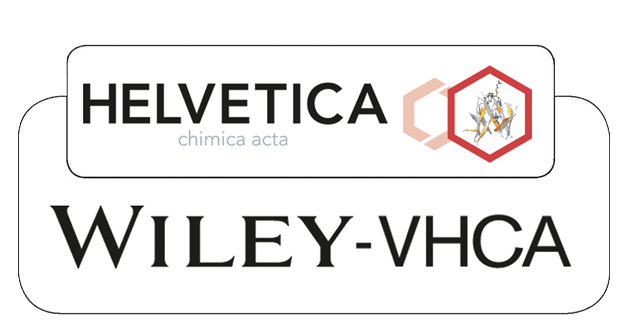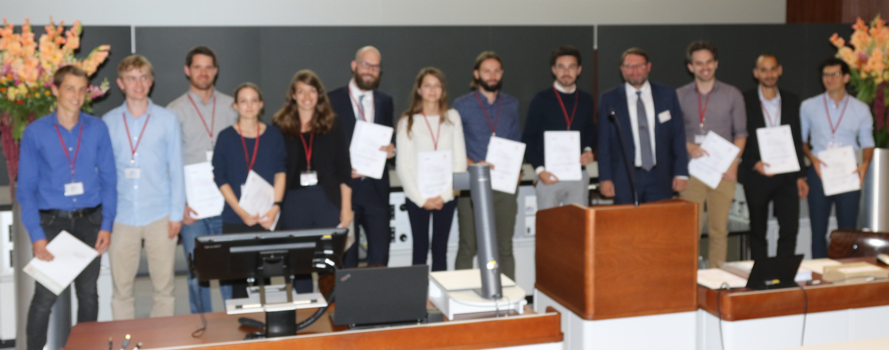Photos of the SCS Fall Meeting, Sep 5-6, 2019
The SCS Fall Meeting 2019 took place at Irchel Campus of University of Zürich on September 6, 2019.
More than 100 lectures and short talks in eight parallel sessions and a poster session with about 420 poster formed the scientific program. 20 companies presented their services and products in a commercial exhibition.
Website of the SCS Fall Meeting 2019
Photos of the SCS Fall Meeting 2019
Dinner in the Zunfthaus zur Waag, September 5, 2019
Best Oral Presentation Award Ceremony
Best Poster Presentation Award Ceremony
Ceremony of the SCS Helvetica Prize 2019
Invited speakers and short talk speakers
Winners of the Exhibitor Challenge
General conference picutres and exhibition
Photos: H.P. Lühti, SCS
Dinner in the Zunfthaus zur Waag, September 5, 2019
{phocagallery view=category|categoryid=61|limitstart=0|limitcount=0}
{phocagallery view=category|categoryid=67|limitstart=0|limitcount=0}
Invited speakers and short talk speakers
{phocagallery view=category|categoryid=63|limitstart=0|limitcount=0}
Winners of the Exhibitor Challenge
{phocagallery view=category|categoryid=68|limitstart=0|limitcount=0}
General conference picutres and exhibition
{phocagallery view=category|categoryid=62|limitstart=0|limitcount=0}
David Spichiger, SCS
10.09.2019
Helvetica Prize of the SCS 2019 awarded to Jovana Milić and Kevin Weiland
 On the occasion of the SCS Fall Meeting 2019 Helvetica, represented by its eidtors in chief, Prof. Christophe Copéret and Prof. Jeff Bode, as well als Helvetica Managing Editor Dr. Richard Smith, awarded the Helvetica Prize of the Swiss Chemical Society for the best published papers of PhD/Postdocs 2018/19 in Helvetica Chimica Acta to Jovana Milić and Kevin Weiland. The prize is endowed with CHF 1'000 for the winner and CHF 500 for the runner up.
On the occasion of the SCS Fall Meeting 2019 Helvetica, represented by its eidtors in chief, Prof. Christophe Copéret and Prof. Jeff Bode, as well als Helvetica Managing Editor Dr. Richard Smith, awarded the Helvetica Prize of the Swiss Chemical Society for the best published papers of PhD/Postdocs 2018/19 in Helvetica Chimica Acta to Jovana Milić and Kevin Weiland. The prize is endowed with CHF 1'000 for the winner and CHF 500 for the runner up.
1st Prize: Jovana V. Milić (ETH Zurich, Group of Prof. François Diederich)
Title of the publication: «Thioether-Functionalized Quinone-Based Resorcin[4]arene Cavitands: Electroswitchable Molecular Actuators»
DOI: https://doi.org/10.1002/hlca.201800225
2nd Prize: Kevin J. Weiland (University of Basel, Group of Prof. Marcel Mayor)
Title of the publication: «A Chiral Macrocyclic Oligothiophene with Broken Conjugation – Rapid Racemization through Internal Rotation»
DOI: https://doi.org/10.1002/hlca.201800205
It's the first time that the Journal in collaboration with the SCS awards this distinction. It highlights scienific excellence of two young researchers and both of them gave a 3min short communication at the SCS Fall Meeting 2019 at University of Zurich on September 6, 2019
{phocagallery view=category|categoryid=64|limitstart=0|limitcount=0}
David Spichiger, SCS
10.09.2019
Winners of the Best Poster Presentation Awards at the SCS Fall Meeting 2019

In collaboration with DSM Nutritional Products, SCS offered again the very attractive and prestigious Fall Meeting Best Poster Award program. Combined with the Best Oral Presentation Awards program this is probably the most highly remunerated award program in the field, and we are very proud and happy to cooperate with our sponsoring partners. We wish to express our sincere gratitude to DSM Nutritional Products Ltd for their generous support and congratulate all winners for their fantastic contributions.
![]() Dr. Thomas Netscher, Principal Scientist at DSM and SCS Senior Industrial Science Award Winner, awarded a total of 23 winners at the end of the SCS Fall Meeting at University of Zurich on September 6, 2019.
Dr. Thomas Netscher, Principal Scientist at DSM and SCS Senior Industrial Science Award Winner, awarded a total of 23 winners at the end of the SCS Fall Meeting at University of Zurich on September 6, 2019.
Winners of the Best Poster Presentation Awards 2019
| Analytical Sciences | |
| Winner | Prerna Yadav, University of Zurich |
| Runner-up | Jacinta Xto, Paul Scherrer Institute, Villigen |
| Catalysis Sciences & Engineering | |
| Winner | Matthias Frei, ETH Zurich |
| Runner-up | Evgeniya Vorobyeva, ETH Zurich |
| Scott Docherty, ETH Zurich | |
| Computational Chemistry | |
| Winner | Veronika Jurásková, EPFL Lausanne |
| Runner-up | Francesco Bosia, ETH Zurich |
| Charleen Don, University of Basel | |
| Inorganic Chemistry | |
| Winner | Mostapha Dakhchoune, EPFL Lausanne |
| Runner-up | Radmila Faizova, EPFL Lausanne |
| Jasper Clarysse, ETH Zurich | |
| Medicinal Chemistry | |
| Winner | Andrea Meier, University of Zurich |
| Runner-up | Chiara Borsari, University of Basel |
| Chemical Biology | |
| Winner | Carlotta Cecchini, University of Geneva |
| Runner-up | Raphaël Simonet-Davin, EPFL Lausanne |
| Organic Chemistry | |
| Winner | Johannes Diesel, EPFL Lausanne |
| Runner-up | Tatyana Grayfer, ETH Zurich |
| Yangbin Liu, University of Geneva | |
| Physical Chemistry | |
| Winner | Simon Scheidegger, ETH Zurich |
| Runner-up | Fabio Steffen, University of Zurich |
| Marie Bischoff, EPFL Lausanne | |
| Polymers, Colloids & Interfaces | |
| Winner | Agata Krywko-Cendrowska, CNRS |
| Runner-up | Michael Giffin, EPFL Lausanne |
|
Prizes for Winners - certificate and cash contribution of CHF 250.00 Prizes for Runners‘ up |
Photos: H.P. Lühti, SCS
{phocagallery view=category|categoryid=65|limitstart=0|limitcount=0}
David Spichiger, SCS
10.09.2019
Winners of the Best Oral Presentation Awards at the SCS Fall Meeting 2019

In collaboration with Metrohm, SCS offered again the very attractive and prestigious Fall Meeting Best Oral Presentation Award program. Combined with the Best Poster Presentation Awards program this is probably the most highly remunerated award program in the field, and we are very proud and happy to cooperate with our sponsoring partners. We wish to express our sincere gratitude to Metrohm for their generous support and congratulate all winners for their fantastic contributions.
![]() Markus Steinke, representative of Merohm, awarded a total of 15 winners at the end of the SCS Fall Meeting at University of Zurich on September 6, 2019.
Markus Steinke, representative of Merohm, awarded a total of 15 winners at the end of the SCS Fall Meeting at University of Zurich on September 6, 2019.
Winners of the Best Oral Presentation Awards 2019
Analytical Sciences
Winner: Jerome Kaeslin, ETH Zurich
Runner-up: Irina Diukova; EPFL Lausanne
Catalysis Sciences & Engineering
Winner: Christopher Gordon, ETH Zurich
Runner-up: Rene Wick-Joliat, University of Zurich
Computational Chemistry
Winner: Alberto Fabrizio, EPFL Lausanne
Runner-up: Johan Runeson, ETH Zurich
Inorganic Chemistry
Winner: Jordan Meyet, ETH Zurich
Runner-up: Deepu Babu, EPFL Lausanne
Medicinal Chemistry
Winner: Kris Meier, University of Bern
Organic Chemistry
Winner: Nicole Hauser, ETH Zurich
Runner-up: Ronan Rocaboy, University of Basel
Physical Chemistry
Winner: Oliviero Cannelli, EPFL Lausanne
Runner-up: Evelyne Parmentier, ETH Zurich
Polymers, Colloids & Interfaces
Winner: Enzo Bomal, EPFL Lausanne
Runner-up: Fabienne Schwab, University of Fribourg
|
Prizes for Winners - certificate and cash contribution of CHF 500.00 Prizes for Runners‘ up |
Photos: Hans Peter Lüthi, SCS
{phocagallery view=category|categoryid=66|limitstart=0|limitcount=0}
David Spichiger, SCS
10.09.2019
Brussels News Update, August 2019
Hello and welcome to the August edition of Brussels News Updates, the monthly EuChemS newsletter keeping you up-to-date on the latest chemistry related science-policy issues, news and upcoming events and awards. With the summer holidays in full swing, business in Brussels has slowed down and we have taken this opportunity to recharge our batteries ahead of a busy upcoming autumn. Nevertheless, here is your monthly BNU with some light summer updates to keep you in the loop!
Enjoy your summer reading,
You can read the full newsletter online here.
European Highlights, Research, Innovation, Education, Entrepreneurship
Horizon Europe: experts of the five major European research and innovation mission boards selected
End of July, the Commissioner for Research, Science and Innovation, Carlos Moedas, announced the names of the experts who have been selected as members of the mission boards to work on five major European research and innovation missions. The missions will be part of Horizon Europe, the next EU research and innovation programme (2021-2027). Read the full story here.
Chemical Industry is on the path to define the "European Way"
The European Chemical Industry Council’s (Cefic) President Daniele Ferrari stressed at the 100th anniversary of the International Union of Pure and Applied chemistry (IUPAC) in Paris, that the EU chemical industry needs to define “The European way”, notably the need to innovate towards circular models, leading on sustainability and being at the forefront of innovation in technologies. Full article available here.
European Research Council plans for 2020
In July, the European Research Council (ERC) announced its biggest ever annual injection of funding in blue-sky research. €2.2 billion will be made available in 2020 to support some 1100 top researchers. As in previous years, most of the funding (61%) is earmarked for early- to mid-career scientists and scholars. The funding will also support jobs for an estimated 8,000 postdoctoral researchers, PhD students and other research staff employed in ERC-funded teams. More information available here and here.
European Parliament elects European Commission President
On 16 July, Ursula von der Leyen was elected to be the next European Commission President following a series of uncertain weeks of negotiations between the various European institutions and eventually the European Parliament’s vote in favour. Read our debrief here.
Next Committee meetings of the European Parliament
The first week in September will be a week for Committee meetings of the European Parliament.
For the ITRE Committee, follow the latest news here: http://www.europarl.europa.eu/committees/en/itre/home.html.
For the ENVI Committee, see http://www.europarl.europa.eu/committees/sl/ENVI/home.html.
For European Parliament 2019 calendar indicating plenary sessions, committee meetings and other activities, visit: http://www.europarl.europa.eu/sed/doc/news/lookingaheadagenda/21361/Cal2019_en.pdf
Consultations & Roadmap
Take part in co-designing Horizon Europe!
Are you a scientist or interested citizen? Take part in the 20-minute survey to shape EU science! EuChemS will in turn also prepare an official response, to which you can also contribute by contacting us directly.
More information here.
EFSA Open Public Consultations
EFSA has a list of open public consultations, you can take a look at them here.
If you would like to contribute to an EuChemS response, please drop us a line.
Fundings, Nominations & Awards
European Chemistry Gold Medal
Every two years, the exceptional achievements of one scientist working in the field of chemistry in Europe are rewarded. The winner is awarded a gold medal and the opportunity to give the opening lecture at the next EuChemS Chemistry Congress (ECC).
Deadline: 30 September 2019
Website: https://www.euchems.eu/awards/european-chemistry-gold-medal/
Marie Skłodowska-Curie (MSCA) open calls
Currently, two calls are open: Individual Fellowships 2019 and Co-funding of regional, national and international programmes 2019. The deadlines are in September, check details here:
Website: https://bit.ly/2ZcSBnJ
EuChemS Events
XX Euroanalysis 2019
1 – 5 September 2019
Istanbul, Turkey
Website: https://bit.ly/2JGjUx2
Celebrating D.I. Mendeleev’s Periodic System: a Historical Perspective
10 – 13 September 2019
Saint Petersburg, Russia
Website: https://bit.ly/2Lm0PDq
GDCh-Wissenschaftsforum Chemie 2019 (WiFo 2019)
15 – 18 September2019
Aachen, Germany
Website: https://bit.ly/2Oolcgk
13th Students‘ Congress of SCTM
19 – 21 September 2019
Skopje, North Macedonia
Website: https://bit.ly/33M6x7M
4th EuChemS Conference on Green and Sustainable Chemistry (EUGSC-4)
22 – 25 September 2019
Tarragona, Spain
Website: https://bit.ly/31FLLES
6th MS Food Day Conference
25 – 27 September 2019
Camerino, Italy
Website: https://bit.ly/2MsrM8T
Other Events
European Research and Innovation Days
24 – 26 September 2019
Brussels, Belgium
Website: https://bit.ly/2uNYJBS
2nd European Education Summit
26 September 2019
Brussels, Belgium
Website: https://bit.ly/2K3QPNA
EuChemS aisbl - Rue du Trône 62, 1050, Brussels, Belgium; www.euchems.eu. Produced for EuChemS by Nineta Hrastelj, Alex Schiphorst and Marta Kucza. This newsletter has been carefully prepared and only contains correct information to the best of EuChemS´ knowledge, however this does not exclude the possibility of existence of incorrect information. EuChemS cannot be liable for the use or misuse of any information, whether correct or incorrect, present at this newsletter. Intellectual property belongs to its rightful owners, always explicitly traceable on each article. Compilation Copyright © 2019 EuChemS
Page 59 of 299

